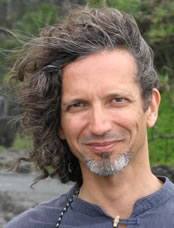



Profile (More Details)
Research Interests
Message to Students
"While chaos comes swiftly and simultaneously to other plates...those two hands are unhurriedly, scientifically, maintaining order, defining garbage, separating what is to be eventually eaten from what is to be thrown away." [Naipaul, V.S. The Mimic Men. London: Penguin Books, 1967. (p.246)]
Much of one's university education, and life in general, is a long process of separating the important from garbage. With the trillions of short messages, emails, and Web pages we deal with each day, this task has never been more challenging. But, finding and noticing the important, and making it our own is essential to being complete citizens and human beings. The study of foreign literature and culture can aid this vital process.
Educational Philosophy
"I try to bring students to the realization that English is a language that 'belongs' to them and all others who use it as a means of communication. It does not belong solely to so-called 'native speakers,' test designers, or other gatekeepers. It can be used as a bridge by people all over the world to cross cultural and linguistic barriers."
Links
ESL/EFL websites and sites offering content in English
Reallyenglish Walk Through
Download IE Texts
Learn/Study English on the cell phone
Podcasts made by Me and My Students
Article on educational uses of cell phones
Article on the creation of podcasts by students and faculty at AGU
Online article about medical ESP
Links related to the textbook Toward the Future
Joseph Dias' latest poetry and graphics
The New IE Program Website
Employment Possibilities
JACET PRESENTATION (June 21, 2009) PPT DOWNLOAD -- PART ONE & PART TWO
JALT 2010 Presentation (Nagoya, Nov. 20, 2010) PPT DOWNLOAD -- A blended learning approach to listening